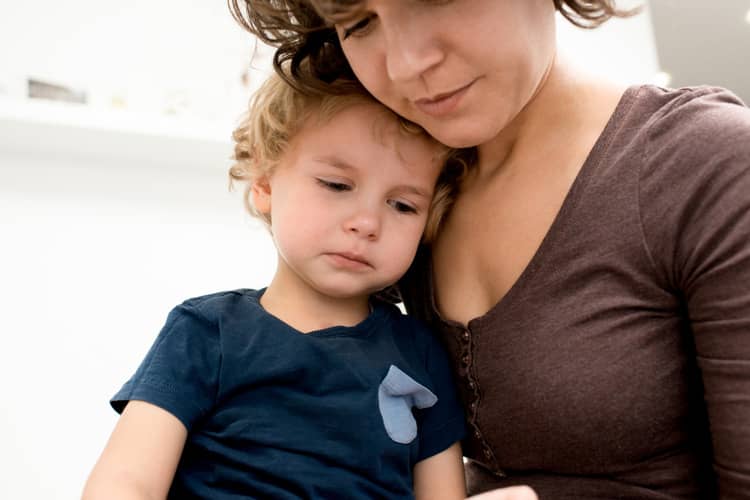
Hysterical attacks in children. How to calm a hysterical child and avoid crying fits
If you are a parent or parenthood is still waiting for you, the stage of caring for a child in the form of dealing with his crying spells and tantrums doesn't sound too appealing. Hysterical crying in children is often a clear sign that the period of defiance is here. The consolation is that not every child has a period of defiance full of tantrums, crying and screaming. However, if such a situation occurs, it is good to know what to do when a child has a tantrum. Attacks of anger can have different duration and intensity. In some children, such manifestations disappear in a week, and in others, such a stubborn period lasts for months. Why do babies cry at night? What does hysterical crying at bedtime mean?
First of all, the assessment that only bad and ill-mannered children have such expressions is absolutely wrong. The first period of resistance is characteristic for the age of 2 to 3 years, but it cannot be fixed at an exact age. Defiance can appear in a child when he is 1 year old, but also when he is 5 years old. In general, however, the first period of resistance typically appears between the 13th and 36th months. How long the resistance period lasts is very individual. Crying hysterically in a 4-year-old is just as likely as tantrums in a 2-year-old. Defiant behavior in children begins and ends differently, and its course is also different. One of the main symptoms of the rebellious period are outbursts of anger and hysterical crying fits in children.
Period of defiance and hysterical attacks in children
Why do hysterical attacks occur in children? The most logical explanation is the period of defiance, for which such manifestations are typical. The defiant period is not the domain of bad, disobedient and ill-mannered children. "First puberty" is a natural phenomenon that occurs in the development of a child. It is related to hormonal changes, but also to intellectual, emotional, psychological and social development. The child's effort is to assert his will, at any cost. Such hysterical attacks are a typical manifestation of the "struggle for power" and testing where are the limits of what the child can afford.
The reason for hysterical expressions, screaming, crying and hitting the ground is that the child cannot control and express his emotions. In the first period of defiance, it is difficult for the child to understand that he has to respect something and he cannot even understand other people's feelings. His emotional development is not mature enough to express this in anything other than anger. In this way, he releases his frustration and believes that he will achieve what he wants. Rejection of parents' love, misunderstanding and anger must be accepted by parents to a certain extent. Understanding on the part of the parents is also crucial for the further emotional development of the child.
An attack of crying and anger has other causes
In addition to the typical attacks that are related to the period of resistance, a crying attack can also appear for other reasons. It is important for parents to figure out why the child cries or screams for no "obvious" reason. With toddlers, it can sometimes be difficult to meet their needs - demands, and this is where the trigger of such behavior can be hidden. Frequent bouts of crying are associated with hunger, fatigue or, for example, illness. Such impulses can often be very subtle, but the child expresses his dissatisfaction very emotionally. Crying fits can also occur due to lack of attention, when the child feels that you are not giving enough time to him or that you are ignoring him.

Understanding from parents
Adequate reactions of parents are the most important in moments of crisis. It is scientifically proven that the way a parent reacts to a tense situation, how it resolves it, has an impact on the subsequent emotional development of the child. In order for your response to be the best possible solution, it is essential to understand what the child is experiencing. Try to empathize with his situation.
Even as a newborn, a helpless child lets us know what he wants by crying or screaming. He doesn't speak, he doesn't show, but parents can still find out what needs to be done to stop the crying. Even at an early age, it is important to keep calm and pay attention to signals - frowning face, shaking hands, kicking legs, blinking, squinting, crying or moaning. In later toddlerhood, the situation is no different, except that the child's expressions have changed and the child begins to feel that he has some power and wants to assert his will. It is important to determine to what extent you allow the child to "rule".
Children always want to make the right decisions, but it takes time to learn what is right. The scene after you leave the field is a typical example. If a child is playing in the sandbox, building a sand castle, and you grab his hand in a second because you have to go home quickly to catch up with the whole daily routine, the child's reactions are, naturally, hysterical fit, screaming, crying and throwing himself on the ground. After all, you just took him out of his environment where he felt good. It is an expression of frustration and dissatisfaction. Just imagine someone doing the same to you and taking something you love right out of your hands. Although children often test the limits of what they can afford, you should always remain calm (easy to say, harder to do) and do not allow the child to become the master of the situation.
It is appropriate to approach the child as an equal partner from an early age. Do not treat the child as a small creature that does not understand anything. Mutual respect is important in every relationship, and this is also true in the parent-child relationship. Toddlers don't understand what a parent wants from them, and sometimes a parent doesn't understand what a toddler wants from them. After all, a child is creative and a human being who is not perfect, learns and makes mistakes. Don't forget that you were a child too.

How to calm a hysterical child
There are several techniques and methods that have proven themselves in practice. When a hysterical attack cannot be prevented in a child, it is important for the parent to remain calm and choose the right solution. This is the only way to resolve the situation and calm the upset child. There is no universal guide on how to calm a hysterical child, but some of the procedures may work in your case.
Prevention of hysterical tantrums
If you and your child have already gone through a hysterical attack and you know that such a situation is imminent, prevention and efforts to prevent such situations are ideal. If you know that the child is doing a certain activity or playing, try to warn him in advance that he has to stop in 10 minutes because you have to go home from the visit. By giving the child an immediate stop and tearing him out of his world of games, you start his defiance, which can erupt into a hysterical attack. If you give the child time to cope with the change in the situation and allow him a few more minutes to devote himself to the given activity, you can prevent such situations that would end in crying and screaming.
Also, if you once know that when shopping in a shopping center you cannot avoid a crying fit before entering the toy store, try to avoid such situations. Try asking your partner, friend, mother-in-law, mother-in-law, or father-in-law to watch your child while you take care of the necessary things. In the same way, you do not require excessive activity from the child if he is tired. Fatigue can be a frequent trigger of tantrums and tantrums.
Strong hug
During a hysterical attack, you become an enemy for the child and he rejects you. Don't feel bad about it, it's normal. You simply do not want to comply with his will, what else to expect. By offering him your love with a hug, you speak to him, you shock him. The child can understand from your reaction that you understand him and will quiet down. Even though the roaring and crying would continue, the child will perceive this act positively. If the scene is taking place in public, grab the child with a hug and take him to privacy, where he will have space to calm down. There is no point in explaining anything to a child during a tantrum, so save the explanation of the consequences of why he didn't get what he wanted for later.

Distract his attention
A very functional and proven method is to distract the child. If the child is resorting to a crying fit or is on the verge of a nervous breakdown, try pointing out a car on the road, a bird in a tree, a dog behind a fence, or something funny that will visually interest him. Feel free to try grimacing or singing, get his attention with something he likes, ask him questions he knows the answer to, give him the opportunity to show how clever he is. You can simply use any stimulus that you can use to calm the child down.
Explain to the child why anger is inappropriate
The explanation can only begin at the moment when the child overcomes the peak phase of the hysterical attack. Otherwise, it has no meaning. Let the child know that you understand his anger and that anger is normal, but the way he wants to get his way is wrong. Explain to him that he must not behave like that next time. If possible, give him space to express himself. Make it clear to him that you are also angry, but such a reaction is inappropriate and he is hurting you with such behavior. The child does not want to hurt his parents and understands that he has to act and express his feelings differently. Ideally. However, understanding may not come the first time.
The practice of the "furious" parent
Some psychologists recommend this technique, others say it has a negative impact on the child. This technique definitely does not have to work for every child, and his reaction may be the opposite. If there is a situation where the child is getting restless, act out the situation that you are angry, you can raise your voice, shout and yell at the child. Don't let yourself be thrown away, control your fake anger. Perhaps you will surprise the child so much that he suddenly forgets what he wanted to achieve with his anger. Such a reaction may make more sensitive children cry.

What not to do when a child has a tantrum
Just as there are rules for dealing with tantrums, there are rules that you absolutely should not follow. Otherwise, it can easily happen that instead of managing a tense situation, the opposite effect will occur. If hysterical crying and tantrums occur, it is better to try to calm the situation, rather than making the course of the attack worse.
- Do not abandon the child and do not ignore him. The only thing this will do is make the child panic. At the same time, in a tense situation, he will feel that he is left alone and does not deserve your love and attention.
- Check yourself during a child's seizure. In no case do not resort to reacting to the child with his "coin" and make him feel radical anger, punish him or perhaps beat him. Don't argue with him. Punishments and threats will only make the situation worse, and if you feel that bullying has taken a toll on the child, know that you can traumatize the child or increase the level of defiance in the future. For example, during normal puberty.
- Do not try to stop the child at any cost. If the child is running amok, it doesn't make much sense to try to talk him down or explain something to him. Even so, he will not accept and perceive you. Let the rampage die down, even though the act is taking place in public. Alternatively, give the child a big hug (even if he objects), take his hand and resolve things in private.
- No concessions are the answer. It's one thing to compromise, but it's another thing if you comply with the child's request. If you go to the doctor and you can soothe the attack with a lollipop, as a last resort, why not. But do not teach the child to do such practices, because he will feel that he will achieve his interests in this way.
- Do not let the child feel bad. In the sense that it is not good to make a child feel that other children obey, but it is bad. Do not try to make the child feel that he is worse than his surroundings. Don't embarrass him or make fun of him. As a result, the child may feel that he is an outsider and that he is not good enough to be accepted by the environment.

Crying attacks in children at night - a sleep ritual
According to several experts, uncontrollable bouts of crying in children at night or before bedtime can often be the result of an inappropriate sleep ritual. Problems with sleep or falling asleep are often caused by an incorrectly set sleep cycle. Mothers or fathers themselves, in good faith, often make the mistake that if the child cries during the night, in an attempt to quickly calm him down, they take him in their arms and put him to sleep. In this way, a reflex is created in the child's subconscious, which he can easily get used to. The subsequent hysterical crying before bedtime can be caused precisely by the fact that the child's sleep cycle is scattered and at the same time the child is demanding what he has become accustomed to. According to psychologists, it is ideal to create a routine for the child with actions, after which he will know that sleep always follows at the given time. The reason for hysterical crying in children can also be nightmares, which, however, do not represent a serious problem for the child.
Hysterical crying in an infant can frighten many parents so much that they panic and worry about what is happening to their otherwise relatively calm child. Especially if the child does not calm down. Of course, the reason for crying fits in young children can be teething, abdominal pain, bloating, fever or the onset of an infectious disease. So pay attention to the symptoms and look for reasons for crying. With small newborns, it is sometimes very difficult to identify what is the reason for their crying. It is important to notice all kinds of signals, from facial expressions to body movements.
Experiences
Parents encounter hysterical attacks mainly during the period of defiance. The child often looks insane with them and cannot be calmed down in any way. Some parents advise to leave the child alone - if he does not have an audience, he will calm down, some advise patting his ass, and some advise arming yourself with patience and waiting out the attacks. Many mothers recommend teaching the child to vent his anger in the right way, because rage from frustration is a natural reaction.
The most frequent questions - FAQ
Have you encountered hysterical attacks while caring for and raising your children? How did you handle hysterical attacks in children at night? How did you calm hysterical crying in children? We will be glad if you share your experience with us. Within the discussion, you have the opportunity to comment and express your own opinion. With your advice and tips, you can help other parents who cannot deal with a similar phase in their children.
What to do when a child has a hysterical attack?
What is a nervous frenzy?
Is it appropriate to imitate a child during a tantrum?
Pridať komentár





